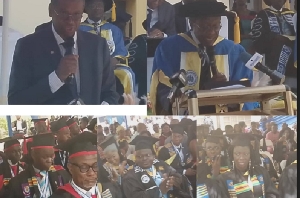The former Vice Chancellor of the University of Mines and Technology (UMaT), Prof. Jerry Kuma, has suggested that private tertiary education institutions be given tax waivers and incentives on some educational facilities to help solve most of their challenges that look non-feasible.
The professor, who bemoaned most challenges confronting private tertiary education institutions and the government's inability to solve most of them due to the already existing numerous burdens on the government, said the effective option that looks more feasible is for private tertiary education institutions to be given tax waivers and incentives on some educational facilities.
He said government support for state institutions comes through infrastructure development and the payment of emoluments for staff, as the older institutions now have to use their IGF to fund any new infrastructure development.
According to him, GETFund, which is one of the funding sources from the government, is even limited as it is being spread through and prioritized mostly to newly established institutions, adding that no administrative or other expenses come from the government to these state tertiary institutions.
He said the government is unable to provide full support for state institutions, adding that it appears it will be extremely difficult for the government to give any meaningful financial support to private tertiary education institutions.
He stressed that the tax waivers, among others, will at least help solve some of the challenges confronting these private institutions.
Prof. Jerry Kumah said there is a need to give tax waivers since these institutions carry a significant part of the burden of educating Ghanaians, something that is primarily the responsibility of the government.
"As of August 2022, there were 150 state and 158 private tertiary education institutions in the country. Of the 158, ten of them are chartered, and the rest, mainly comprising university colleges", he said.
Mentioning most of the challenges confronting private tertiary education institutions in Ghana, the former Vice Chancellor of UMaT said that establishing a private tertiary education institution is a capital-intensive undertaking that requires dedicated and significant initial and sustained investment for a minimum period of between 7 and 10 years before, if properly managed, the institution becomes self-financing.
According to him, the main challenge confronting private tertiary education institutions is financial since it is the foundation for their progress and success, and this must also be provided through funding for infrastructure development and administrative expenditure, among others.
"Others include ITC infrastructure and its maintenance costs, the emolument of all staff, mentorship and appreciation fees, and this does not come cheap. Library and other miscellaneous expenses such as advertisement drives to get more students and transportation, among others," he added.
Another challenge he touched on is the fact that the student population in private tertiary education institutions is very low compared to public institutions.
The next issue of concern is the recruitment and retention of highly qualified staff by private tertiary institutions.
"These challenges have led to a long-standing request from private tertiary education institutions for the government to support them financially through get-funding and producing concessions when it comes to taxing educational items," he said.
The professor made these observations during the 47th graduation ceremony for both postgraduate and undergraduate students of the Christian Service University College (CSUC).
Prof. Jerry Kuma, who delivered the keynote address, spoke under the theme "Christian Higher Education in Ghana: Past, Present, and Future."
Describing the theme as a very appropriate one, the former Vice Chancellor said that private tertiary institutions, especially religious ones, have the potential to turn their disadvantages into advantages by aligning with the principles of their faith.
"By following a disciplined approach rooted in Christian values and focusing on quality education, these institutions can build a strong brand and attract both students and industry recognition," he said.
According to him, the proposed actions for enhancing success include alignment with Christian values, compliance, and quality assurance.
He explained that they are involved in building a reputable and high-quality brand that attracts both industry recognition and students' interest, brand building and feedback, student recruitment, and welfare, which focuses on prioritising student recruitment strategies, welfare programs, and incentives to attract and retain students.
On his part, Professor Sam Afrane, the university's president, said, unlike the last academic year, this year's ceremony, which was catering to both postgraduate and undergraduate students, had a total of 438 graduating students.
According to him, 180, representing 41%, were postgraduates, while 258 (59%) were undergraduate students.
"For the postgraduate students, 120 are graduating in Accounting and Finance, 41 in Monitoring and Evaluation, 10 in Christian Ministry, and 9 in Corporate Planning and Governance," he said.
Detailing the 258 undergraduate students, he said that some were from the Faculty of Humanities, while others were from the School of Business and the Faculty of Health and Applied Science.
Out of this number, he said, 140, representing 54.0 percent, were males, while 118, representing 46 percent, were females.
In terms of the performance of the undergraduate students, he said 21 (8.1%) graduated with a first-class division, 94 (36.4%) had a second-class upper division, 132 (51.1%) finished with a second-class lower division, and 11 (5.0%) students graduated with a third-class division.
The CSUC President showed gratitude to God and also urged the graduating students to utilize what they have gained to create opportunities.
"You are entering a world highly driven by technology, science, and artificial intelligence. Job opportunities, particularly in the formal sector, are dwindling by the day. Hopelessness is creeping through the minds of many young people around the globe. The question is: how do you cope and navigate your way through this maze of challenges in the world before you? Winston Churchill, the Prime Minister of the UK after the Second World War, offers cogent advice in this situation. The pessimist sees difficulty in every opportunity, while the optimist sees opportunity in every difficulty," he said.
Regional News of Friday, 8 March 2024
Source: Nana Peprah, Contributor

















